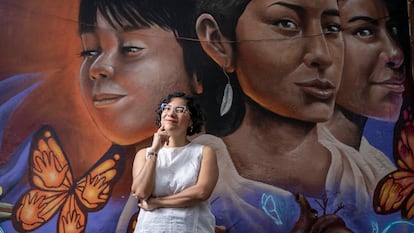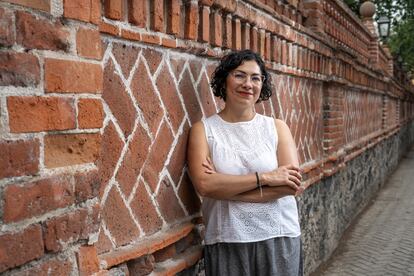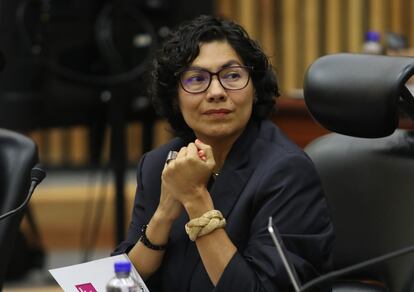Rita Bell, election official: ‘Political parties in Mexico continue to be controlled by men even if a woman comes to power’
The member of the General Council of the National Electoral Institute analyzes the advances, setbacks and threats to the political and voting rights of women in the country


“Men never understood that women were valuable and had rights,” says Rita Bell López-Vences. The 45-year-old lawyer and academic is a member of the General Council of Mexico’s National Electoral Institute (INE), the body in charge of organizing elections and ensuring the electoral rights of citizens. Bell López-Vences sits down to talk about her career and the political rights of women in Mexico, but above all she talks about what she has learned throughout her life.
Before coming to the INE, she worked at the Women’s Institute in Oaxaca and later at the Oaxaca Electoral Institute, where she served as president of the Commission on Indigenous Regulatory Systems. “There is a lot to learn from Indigenous regulatory systems, which are practices that communities have done over the years and are based on their own system of election,” she explains.
Bell López-Vences is the granddaughter of Elvira, a Zapotec Indigenous woman on her father’s side, and Guadalupe, a migrant born in Michoacán, on her mother’s side. Since she was young, her life and work since has revolved around the rights of women and Indigenous peoples. “Dealing with cases of gender violence as a lawyer marked me and changed my life because I learned to see my career and the situation of women from another perspective,” she says.
Since 1953 women have been able to vote in Mexico. That period of time — 71 years — is not a lot if you take into account that the modern Mexican state was created 200 years ago. Throughout this time, women’s political and electoral rights have been constantly questioned and violated, so much so that in 2014, a constitutional reform had to be passed to protect their participation. That was when the parity principle was established, which meant that parties had to nominate the same number of men as women in the elections. “It was crucial,” says the election official. “In previous years, the presence of women in politics was always very discreet due to gender-based political violence that prevented them from reaching these spaces.”
Despite this achievement, women continue to face political violence and fraud, says Bell López-Vences, who says the criteria for participation must be urgently reviewed because “some men have decided to nominate their daughters or their wives and thus maintain their own power.”
Since the parity rules were introduced, women’s political participation has grown in Mexico, leading to the most gender-equal Cabinet in history, with women making up 50% of Congress and the Senate, and to the largest number of female governors. Why was parity so important to Mexico’s political sphere? “Because there are still great inequalities, and we can still hear men in power questioning our capacity and saying that we should stay at home,” says Bell López-Vences.
This expert explains that equality in legislation is not enough if the parties continue to perpetuate the same patriarchal and violent structures that they’ve had since the beginning of the 20th century. “There is reluctance in the parties because it is about power, and they do not want to lose those spaces,” she explains. “Political parties are still controlled by men, their inner circle is male and the leaders are powerful men, even if a woman comes to power. The parties in Mexico do not have a feminist or equality vision, they are very masculinized.”

It was feminists and the broad women’s movement who fought to be recognized as citizens. From the First Feminist Congress in Yucatán in 1916, through to the right to vote and until today, women in Mexico have fought inch by inch for their rights. This year, the INE approved the 8 out of 8 initiative, a procedure to verify that the candidates nominated by the parties do not have convictions for sexist violence. “It was approved to put a limit on so much gender violence that exists in our country, and it was thanks to women’s organizations,” she points out.
In Oaxaca, she dedicated herself to working for political rights in Mexico and against political gender violence, one of the most common forms of violence against women, but once there, she realized that it was not enough. The political sphere had to reflect society as closely as possible, and she saw that minorities, people with disabilities, Indigenous and Afro-Mexican people, and sexually diverse people were missing. So affirmative action was taken. “Specific quotas were created for groups in situations of discrimination or inequality because society demanded something more than 50-50 parity,” she explains.
Rita Bell López-Vences says that it has been very difficult to carry out these affirmative actions due to the resistance from the parties. Also because many parties tried to nominate men by passing them off as trans women, “it is incredible how they take advantage of any gap to try to usurp a nomination that should be authentic and for the people,” she says,
Two months ago, for example, Silvana Valenzuela — the traditional Maya-Yoreme governor of the community of La Florida, in the state of Sinaloa — denounced that several candidates who did not belong to her community and did not speak her language asked her to sign a letter accrediting that they belonged to the Mayo-Yoreme people in order to occupy several Indigenous candidacies. And in 2021, 18 men from the National Action Party (PAN) and the Institutional Revolutionary Party (PRI) in Tlaxcala registered as transgender women to avoid the parity requirements imposed by law, a ploy that was also seen in Oaxaca in 2018.

When asked what it means for the country to have its first female president, Rita Bell López-Vences reflects for a moment: “I think that will be defined by the way people govern. The issue of women’s participation must also serve men. It is unfortunate that we have had to set quotas because men never understood that women were different, we were valuable, we had rights and a vision of the world,” she responds. “The ideal would be for a man or a woman to understand the great responsibility they have towards citizens in general, and that starts with understanding that there are men and women and that we are equal.”
It is the first time that the National Electoral Institute has five female members of the Council and that the presidency is occupied by a woman, Guadalupe Taddei Zavala. Her time at the institution will undoubtedly leave a mark on her successor. Bell López-Vences, however, has no aspirations of being “remembered.” “At the end of my time at the INE, I would like to have contributed something to help my country consolidate a democratic system in which women and all people can come to power.”
When asked what her grandmothers would say about her being an election official, she replies: “I think they would be proud, although they would also be very worried. Deep down, I believe that this was what they always wanted for us, after having lived a life full of deprivation and suffering. They always told us: ‘Study and seek freedom.’”
Sign up for our weekly newsletter to get more English-language news coverage from EL PAÍS USA Edition
Tu suscripción se está usando en otro dispositivo
¿Quieres añadir otro usuario a tu suscripción?
Si continúas leyendo en este dispositivo, no se podrá leer en el otro.
FlechaTu suscripción se está usando en otro dispositivo y solo puedes acceder a EL PAÍS desde un dispositivo a la vez.
Si quieres compartir tu cuenta, cambia tu suscripción a la modalidad Premium, así podrás añadir otro usuario. Cada uno accederá con su propia cuenta de email, lo que os permitirá personalizar vuestra experiencia en EL PAÍS.
¿Tienes una suscripción de empresa? Accede aquí para contratar más cuentas.
En el caso de no saber quién está usando tu cuenta, te recomendamos cambiar tu contraseña aquí.
Si decides continuar compartiendo tu cuenta, este mensaje se mostrará en tu dispositivo y en el de la otra persona que está usando tu cuenta de forma indefinida, afectando a tu experiencia de lectura. Puedes consultar aquí los términos y condiciones de la suscripción digital.








































